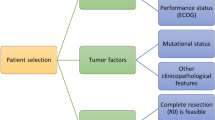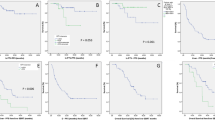Abstract
Purpose
The target lesion response (according to the Choi criteria), safety and survival following selective or superselective transarterial radioembolisation using yttrium-90-resin microspheres (90Y-RE) were evaluated in patients with unresectable, chemotherapy-refractory colorectal cancer liver metastases (mCRC).
Materials and methods
A prospective case series evaluated 52 consecutive patients with mCRC who were treated at a single centre following a median of 2 lines of chemotherapy.
Results
Nearly half (46.2 %) of the 52 patients had a prior resection of the liver. At baseline, mCRC was limited to the liver (in 56.9 %), liver plus extra-hepatic metastases (23.5 %) or liver plus lung micro-nodules (19.6 %). Disease control rates of target lesions (partial response plus stable disease) at 3 and 6 months post-90Y-RE were 59 and 29 %, respectively. Target lesions were sufficiently downsized in two patients for hepatic resection and in one patient for radiofrequency ablation. Median Kaplan–Meier survival was 11.0 months (95 % confidence interval: 8.0–14.0 months) overall and 12.0 months in liver-only disease (±lung micro-nodules). Determinants of prolonged survival were response at 3 months (P = 0.046), ≤5 liver nodules (P = 0.004), single-liver-lobe involvement (P = 0.037), tumour-to-whole liver ratio <25 % (P = 0.021) and absence of extrahepatic metastases (P = 0.045). Adverse events possibly related to the nontarget distribution of 90Y-RE were grade 1 90Y-RE-induced liver disease (n = 1), grade 2 and 3 gastric ulcers (n = 2).
Conclusion
These results confirm the effectiveness and safety of selective 90Y-RE in patients with chemotherapy-refractory mCRC, showing 90Y-RE’s potential as a bridging therapy to subsequent resection even in this end-stage population.


Similar content being viewed by others
References
Ferlay J, Steliarova-Foucher E, Lortet-Tieulent J et al (2013) Cancer incidence and mortality patterns in Europe: estimates for 40 countries in 2012. Eur J Cancer 49:1374–1403. doi:10.1016/j.ejca.2012.12.027
Manfredi S, Lepage C, Hatem C et al (2006) Epidemiology and management of liver metastases from colorectal cancer. Ann Surg 244:254–259. doi:10.1097/01.sla.0000217629.94941.cf
Padman S, Padbury R, Beeke C et al (2013) Liver only metastatic disease in patients with metastatic colorectal cancer: impact of surgery and chemotherapy. Acta Oncol 52:1699–1706. doi:10.3109/0284186x.2013.831473
Amano R, Yamada N, Nakata B et al (2013) A prognostic indicator for the resection of liver metastasis of colorectal cancer. Surg Today. doi:10.1007/s00595-013-0699-x
Grothey A, Van Cutsem E, Sobrero A et al (2013) Regorafenib monotherapy for previously treated metastatic colorectal cancer (CORRECT): an international, multicentre, randomised, placebo-controlled, phase 3 trial. Lancet 381:303–312. doi:10.1016/S0140-6736(12)61900-X
Altomare I, Bendell JC, Bullock KE et al (2011) A phase II trial of bevacizumab plus everolimus for patients with refractory metastatic colorectal cancer. Oncologist 16:1131–1137. doi:10.1634/theoncologist.2011-0078
Seymour MT, Brown SR, Middleton G et al (2013) Panitumumab and irinotecan versus irinotecan alone for patients with KRAS wild-type, fluorouracil-resistant advanced colorectal cancer (PICCOLO): a prospectively stratified randomised trial. Lancet Oncol 14:749–759. doi:10.1016/s1470-2045(13)70163-3
Siu LL, Shapiro JD, Jonker DJ et al (2013) Phase III randomized, placebo-controlled study of cetuximab plus brivanib alaninate versus cetuximab plus placebo in patients with metastatic, chemotherapy-refractory, wild-type K-RAS colorectal carcinoma: the NCIC Clinical Trials Group and AGITG CO.20 Trial. J Clin Oncol 31:2477–2484. doi:10.1200/jco.2012.46.0543
Chen HX, Mooney M, Boron M et al (2006) Phase II multicenter trial of bevacizumab plus fluorouracil and leucovorin in patients with advanced refractory colorectal cancer: an NCI Treatment Referral Center Trial TRC-0301. J Clin Oncol 24:3354–3360. doi:10.1200/jco.2005.05.1573
Lenz HJ, Van Cutsem E, Khambata-Ford S et al (2006) Multicenter phase II and translational study of cetuximab in metastatic colorectal carcinoma refractory to irinotecan, oxaliplatin, and fluoropyrimidines. J Clin Oncol 24:4914–4921. doi:10.1200/jco.2006.06.7595
Saltz LB, Rosen LS, Marshall JL et al (2007) Phase II trial of sunitinib in patients with metastatic colorectal cancer after failure of standard therapy. J Clin Oncol 25:4793–4799. doi:10.1200/jco.2007.12.8637
Vincenzi B, Santini D, Russo A et al (2009) Bevacizumab in association with de Gramont 5-fluorouracil/folinic acid in patients with oxaliplatin-, irinotecan-, and cetuximab-refractory colorectal cancer: a single-center phase 2 trial. Cancer 115:4849–4856. doi:10.1002/cncr.24540
Van Hazel G, Blackwell A, Anderson J et al (2004) Randomised phase 2 trial of SIR-Spheres plus fluorouracil/leucovorin chemotherapy versus fluorouracil/leucovorin chemotherapy alone in advanced colorectal cancer. J Surg Oncol 88:78–85. doi:10.1002/jso.20141
Sharma RA, Van Hazel GA, Morgan B et al (2007) Radioembolization of liver metastases from colorectal cancer using yttrium-90 microspheres with concomitant systemic oxaliplatin, fluorouracil, and leucovorin chemotherapy. J Clin Oncol 25:1099–1106. doi:10.1200/JCO.2006.08.7916
Kosmider S, Tan TH, Yip D et al (2011) Radioembolization in combination with systemic chemotherapy as first-line therapy for liver metastases from colorectal cancer. J Vasc Interv Radiol 22:780–786. doi:10.1016/j.jvir.2011.02.023
Cosimelli M, Golfieri R, Cagol PP et al (2010) Multi-centre phase II clinical trial of yttrium-90 resin microspheres alone in unresectable, chemotherapy refractory colorectal liver metastases. Br J Cancer 103:324–331. doi:10.1038/sj.bjc.6605770
Seidensticker R, Denecke T, Kraus P et al (2012) Matched-pair comparison of radioembolization plus best supportive care versus best supportive care alone for chemotherapy refractory liver-dominant colorectal metastases. Cardiovasc Intervent Radiol 35:1066–1073. doi:10.1007/s00270-011-0234-7
Kennedy A, Nag S, Salem R et al (2007) Recommendations for radioembolization of hepatic malignancies using yttrium-90 microsphere brachytherapy: a consensus panel report from the radioembolization brachytherapy oncology consortium. Int J Radiat Oncol Biol Phys 68:13–23. doi:10.1016/j.ijrobp.2006.11.060
Choi H, Charnsangavej C, Faria SC et al (2007) Correlation of computed tomography and positron emission tomography in patients with metastatic gastrointestinal stromal tumor treated at a single institution with imatinib mesylate: proposal of new computed tomography response criteria. J Clin Oncol 25:1753–1759. doi:10.1200/jco.2006.07.3049
van der Veldt AA, Meijerink MR, van den Eertwegh AJ et al (2010) Choi response criteria for early prediction of clinical outcome in patients with metastatic renal cell cancer treated with sunitinib. Br J Cancer 102:803–809. doi:10.1038/sj.bjc.6605567
Hickey R, Lewandowski R, Salem R (2014) Yttrium-90 radioembolization is a viable treatment option for unresectable, chemorefractory colorectal cancer liver metastases: further evidence in support of a new treatment paradigm. Ann Surg Oncol. doi:10.1245/s10434-014-4165-9
Saxena A, Meteling B, Kapoor J et al (2014) Is yttrium-90 radioembolization a viable treatment option for unresectable, chemorefractory colorectal cancer liver metastases? A large single-center experience of 302 patients. Ann Surg Oncol. doi:10.1245/s10434-014-4164-x
Raval M, Bande D, Pillai AK et al (2014) Yttrium-90 radioembolization of hepatic metastases from colorectal cancer. Front Oncol 4:120. doi:10.3389/fonc.2014.00120
Kalva SP, Rana RS, Liu R et al (2014) Yttrium-90 radioembolization as salvage therapy for liver metastases from colorectal cancer. Am J Clin Oncol. doi:10.1097/coc.0000000000000151
Bester L, Meteling B, Pocock N et al (2012) Radioembolization versus standard care of hepatic metastases: comparative retrospective cohort study of survival outcomes and adverse events in salvage patients. J Vasc Interv Radiol 23:96–105. doi:10.1016/j.jvir.2011.09.028
Hendlisz A, Van den Eynde M, Peeters M et al (2010) Phase III trial comparing protracted intravenous fluorouracil infusion alone or with yttrium-90 resin microspheres radioembolization for liver-limited metastatic colorectal cancer refractory to standard chemotherapy. J Clin Oncol 28:3687–3694. doi:10.1200/JCO.2010.28.5643
Kennedy A, Ball D, Cohen Sea (2013) Safety and efficacy of resin 90Y-microspheres in 548 patients with colorectal liver metastases progressing on systemic chemotherapy. ASCO Gastrointestinal Cancers Symposium Abs p 264
Yamaguchi T, Mori T, Takahashi K et al (2008) A new classification system for liver metastases from colorectal cancer in Japanese multicenter analysis. Hepatogastroenterology 55:173–178
(2013) Synchronous colorectal liver metastasis in patients without node metastasis: possibility of localized liver metastasis. Hepatogastroenterology 60: 1348–1350
Wasan H, Kennedy A, Coldwell D et al (2012) Integrating radioembolization with chemotherapy in the treatment paradigm for unresectable colorectal liver metastases. Am J Clin Oncol 35:293–301. doi:10.1097/COC.0b013e3182005747
Wasan HS, Chen M, Gungor H et al (2014) Chemo-radioembolisation for chemotherapy-refractory liver-dominant metastatic colorectal cancer. Br J Cancer (in press)
Sofocleous CT, Sideras P, Petre EN (2013) “How we do it”—a practical approach to hepatic metastases ablation techniques. Tech Vasc Interv Radiol 16:219–229. doi:10.1053/j.tvir.2013.08.005
Saxena A, Bester L, Shan L et al (2014) A systematic review on the safety and efficacy of yttrium-90 radioembolization for unresectable, chemorefractory colorectal cancer liver metastases. J Cancer Res Clin Oncol 140:537–547. doi:10.1007/s00432-013-1564-4
Muenzel D, Engels HP, Bruegel M et al (2012) Intra- and inter-observer variability in measurement of target lesions: implication on response evaluation according to RECIST 1.1. Radiol Oncol 46:8–18. doi:10.2478/v10019-012-0009-z
Tochetto SM, Tore HG, Chalian H, Yaghmai V (2012) Colorectal liver metastasis after 90Y radioembolization therapy: pilot study of change in MDCT attenuation as a surrogate marker for future FDG PET response. AJR Am J Roentgenol 198:1093–1099. doi:10.2214/ajr.11.6622
Kennedy AS, Ball D, Cohen SJ et al (2013) Hepatic imaging response to 90Y-microsphere therapy administered for tumor progression during systemic chemotherapy in patients with colorectal liver metastases. ASCO Gastrointestinal Cancers Symposium Abs p 70
Hipps D, Ausania F, Manas DM et al (2013) Selective interarterial radiation therapy (SIRT) in colorectal liver metastases: how do we monitor response? HPB Surg 2013:570808. doi:10.1155/2013/570808
Acknowledgments
An educational grant was provided by Sirtex Medical Ltd to aid in the analysis of data and the editing of the manuscript. We would like to thank Mark Van Buskirk for his statistical work and advice; and Rae Hobbs for her editorial assistance. The final version of the manuscript has been approved by all authors.
Conflict of interest
Dr. Golfieri has been a speaker for Bayer AG (Leverkusen, Germany), Boston Scientific (Natick, MA, USA) and Sirtex Medical Ltd (Sydney, Australia). All other authors declare that they have no conflicts of interest.
Ethical approval
For this type of study formal consent is not required.
Author information
Authors and Affiliations
Corresponding author
Rights and permissions
About this article
Cite this article
Golfieri, R., Mosconi, C., Giampalma, E. et al. Selective transarterial radioembolisation of unresectable liver-dominant colorectal cancer refractory to chemotherapy. Radiol med 120, 767–776 (2015). https://doi.org/10.1007/s11547-015-0504-6
Received:
Accepted:
Published:
Issue Date:
DOI: https://doi.org/10.1007/s11547-015-0504-6




